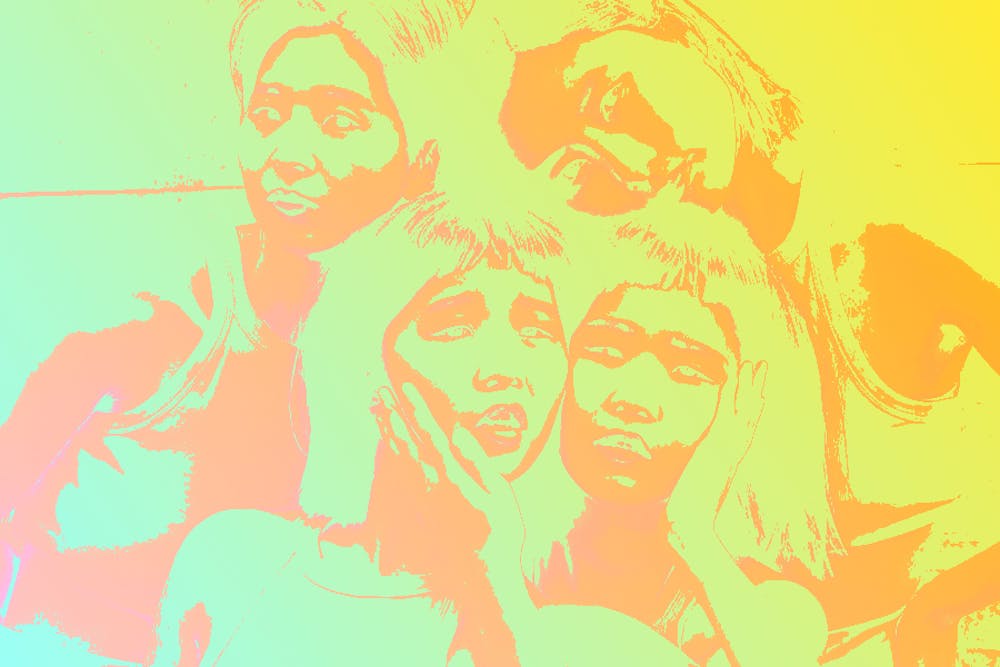The music video for Japanese rock band CHAI’s “N.E.O.” opens in a bright pink room with all four members wearing matching pink outfits. As the members’ faces flash on the screen, they are accompanied by the frenetic lyrics, “YOU ARE SO CUTE, NICE FACE, C’MON, YEAH!”
If taken purely on its surface–level messaging, “N.E.O.” is a standard song extolling the virtues of self–love. The Japanese lyrics of the song emphasize how “small eyes” and an “uncinched waist” still comprise a “nice body.” But “N.E.O.”—and CHAI’s entire aesthetic—diverge sharply from familiar songs that are (for better or for worse) considered to be body–positivity anthems, such as Meghan Trainor’s “All About That Bass.”
Everything about CHAI, from their styling to lyrical delivery, is drenched in a wholesale cuteness. They wear bright pinks, reds, oranges, and purples when performing live. Though their lyrical content sharply varies from song to song, they share a similar exuberance: they say “What a cute girl you are! / Everybody's wonderful / All right!” in “I’m me,” or “Hello, hello, would you like / Hello, hello, would you like any donuts, honey?” in the aptly named song “Donuts Mind If I Do.”
“Neo–kawaii” is the term the members use to describe themselves, a repackaging of traditionally cute aesthetics for everyone. Speaking with the New York Times, Mana, the leader of the band’s music, explained, “We didn’t fit into this definition of cute, which was considered the biggest form of accomplishment in Japan.”
Feeling as though you can’t fit into a certain mold is familiar, but feeling excluded from cuteness is an especially relatable feeling. For me, the desire to possess a certain type of East Asian femininity is right near the top of my priority list, perhaps topped only by my desire to become a white frat boy. My negotiating with those desires often comes in a sardonic, half–serious form—the very way of phrasing those desires, for one, or joking about wearing a backwards snapback, a cute dress—but it’s also accompanied by an ugly and genuine feeling of envy over something that is, quite literally, unattainable.
The concept of cuteness is a complicated one for East Asian women. Purveying pop groups or celebrities leads to the inevitable conclusion that cuteness is a beauty ideal. To a certain extent, being cute, like fitting into any beauty standard, has cultural significance, even power. At the same time, East Asian women are commonly infantilized and fetishized, treated as children or docile or innocent or sexualized, all at once, and cuteness only feeds into those stereotypes. There is a simultaneous desire to reject cuteness and crave it.
In her study of aesthetics in capitalism, Dr. Sianne Ngai, a professor of English at the University of Chicago, notes that cute objects are compelling because of their powerlessness, that cuteness “evok[es] tenderness for ‘small things’ but also, sometimes, a desire to belittle or diminish them further.” Cuteness, particularly in commodification, often operates on a power imbalance, invoking a desire to protect or care for the object (think Baby Yoda), which is an experience that can be profoundly othering. Citing Lori Merish, Ngai writes that cuteness is at once a “repression,” as the cute object is sympathized with and pitied, and “acknowledgment” of otherness, as the cute object is viewed as a “freak.” The insistence that East Asian women are cute duly follows suit; we are affiliated with cuteness and, thus, with “the infantile, the feminine, and the unthreatening.”
Then how can we negotiate with the desire to be cute?
Even though CHAI feels as cute as cuteness gets, their aesthetic is starkly different from mainstream commercialization of cuteness in East Asian popular culture. For example, in K–pop, cuteness is also demonstrated as a concept, but it uses more typical symbols. Bands wear high–school–inspired outfits. The lyrics are saccharine yet coherent. This draws a sharp contrast with the disjointed exclamations in songs such as “N.E.O.” Additionally, K–pop idols, with only a few exceptions, have very little control over their image or their music, with their management companies (such as SM or YG Entertainment) driving the creative decisions, particularly in the early years of any group. Cuteness is taken seriously as a commercial enterprise.
CHAI’s conscious and personal decision to perform cuteness goes to the point of too much and crosses it. Everything about their music becomes an exaggerated possession of cloying sweetness, all the while being energetic and relentlessly catchy. Even in feeling as though they do not fit the desired mold, CHAI imitates and possesses cuteness while going steps, even miles further in comparison to that which is popularly commodified.
Perhaps counterintuitively, CHAI negotiates with the desire to be cute by wholly embracing that envy. In her writing on various ugly feelings, Ngai speaks about the political power of envy, which “would seem to enable [her] to critically negotiate rather than simply disavow or repudiate” a desire to fit cultural beauty standards. In other words, envy allows us to negotiate with all the ugliness in our desires without needing to pretend as though we are immune to it, and provides an outlet through which we can turn desire into antagonism.
Feeling envy of a certain ideal and emulating said ideal are conscious reminders that we do not identify with it. The act of imitation in CHAI’s entire conception of “Neo–kawaii” becomes a way of refusing to idealize cuteness, by turning cuteness “into something nonsingular and replicable.” CHAI’s cuteness is not a concession to idealized views of kawaii, but a polemic accession into it that calls into question whether or not cuteness even can be idealized if it is so easily reproducible.
In their cuteness, CHAI ruins the perceived sanctity of standard East Asian femininity and rebuts the idea that cuteness is an impenetrable concept. CHAI, from their discography to their live performances, wearing bright colors and performing along to their rapid–fire rock music, are wholly and inexhaustibly exhilarating in their subversiveness.

